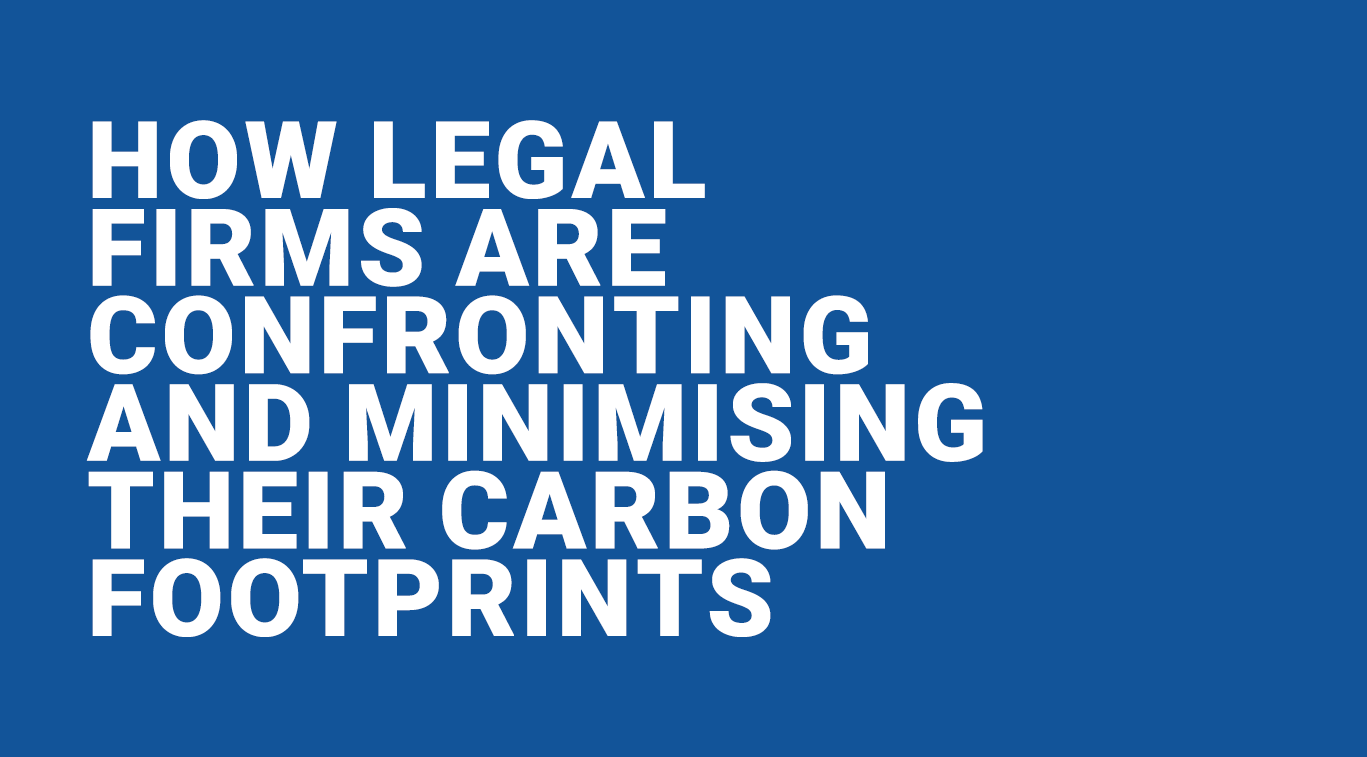How Legal Firms Are Confronting and Minimising Their Carbon Footprints
Law firms are combatting hurdles in an effort to reduce their environmental impact inline with carbon neutral measures.

Written by Fatima Freifer
Blogger

Introduction
As the legal profession continues to grow and evolve, so too does its environmental impact and the impact of technology on legal services. From the immense amount of paper used in discovery and litigation to the daily commute of lawyers and staff, technology in the legal sector has a significant carbon footprint. In recent years, however, many firms have taken steps to reduce their impact on the environment. One way that firms are cutting down on their emissions is by investing in green infrastructure and legal technology solutions. This can mean anything from installing solar panels to using energy-efficient lighting and HVAC systems.
Firms are also encouraging employees to adopt sustainable commuting habits, such as carpooling, biking, or taking public transportation. Additionally, many firms are reconsidering their law firm document management technology, opting for digital documents whenever possible. [1] By implementing these new legal technology software measures and other sustainability measures, legal firms are doing their part to reduce their carbon footprints.
Firms are under increased pressure to reduce their carbon footprints while operating more efficiently whilst simultaneously keeping up with legal technology trends. With world-wide emissions accounting for nearly three-quarters of all human-induced greenhouse gas emissions, and according to the International Energy Agency, the industrial sector is responsible for over two-thirds of total greenhouse gas emissions. [2] In addition to the environmental and social impacts of air pollution, land use change, and natural disasters, climate change will impose tremendous pressure on legal firms to reduce their greenhouse gas emissions. Regulating carbon and other greenhouse gases is on the rise. Many jurisdictions, such as the European Union, have set strict mandatory carbon emission reduction targets for their industries. In addition, the Climate Change Committee in line with the UK governments has a plan to reduce the UK’s emissions by 78% by 2035 [3]. The legal industry must act now in order to minimise the adverse impacts of climate change on society and its businesses in the long-term.
Why Are Legal Firms Confronting Their Carbon Footprints?
The advent of climate change is becoming a long-term driver of change in the legal sector. [4] Climate change will have an impact on the way legal firms operate, deliver services, and engage with their communities. As a result, firms must assess their climate change risk and develop strategies to mitigate these risks. [5] Increased regulation is another reason that legal firms are confronting their carbon footprints. The legal industry will be one of the first sectors to be regulated for carbon emissions, and legal firms may be at a competitive disadvantage if they are not prepared. This extends to all departments, including the HR department which leads employment in legal software jobs and legal software trainer jobs.[6]
Reducing Baseline Emissions
Firms are reducing their collective greenhouse gas emissions by reducing their individual emissions.
In the same way that a legal firm embraces legal technology, artificial intelligence and the future of law practice, it is also becoming increasingly relevant to implement structural changes to the way emissions are being handled. [7] This is being applied by reducing consumption and consumption habits, such as improving energy efficiency, reducing waste, and improving asset management. Firms can also reduce emissions by offsetting their emissions. Offsetting allows firms to pay for a reduction of greenhouse gas emissions through a reduction of emissions elsewhere, such as planting trees or generating renewable energy. This potential for offsetting has the potential to increase the visibility of the legal sector’s carbon emissions and provide an incentive for firms to reduce their emissions. While there are many challenges that legal firms face when it comes to reducing their environmental impact, the benefits of doing so are clear. In addition to helping to protect the environment, reducing a firm’s carbon footprint can also lead to cost savings and increased efficiency. [8]
Adaptation and Risk Management
Adaptation and risk management strategies address the potential for changes in climate, such as by reducing the risk of intense heat waves or heavy rainfalls. Adaptation is the process of adapting to expected changes and risks, while risk management addresses the decision to adapt to expected changes and risks, and how to manage these risks. [9] Firms can develop adaptive strategies to respond to changing climate conditions, such as by implementing building upgrades and adjusting service delivery to mitigate the impacts of increased heat or heavy rainfall. Adaptation and risk management can reduce the risk of climate change impacts, including property damage and service interruptions, while at the same time maximising the business benefit.
Conclusion
Firms can minimise their carbon footprints by reducing their baseline emissions and implementing adaptation and risk management strategies. Increasing regulation may also require firms to report their emissions, which can help firms meet these goals. Firms can also offset their emissions by participating in offsetting programs, which allow firms to make a financial contribution to a project that reduces emissions elsewhere. Legal firms have an opportunity to lead the way in terms of sustainability and environmental responsibility. In taking these steps, legal firms are not only helping to protect the environment but also reducing their operating costs. As more and more businesses see the value in sustainable practices, legal firms that embrace these measures will be in a strong position to set themselves apart from their competitors. [10] Carbon is one of the most significant challenges for the legal sector, and it will be important for firms to act now in order to minimise the adverse impact of climate change on society.
References
[1] Global Green Guide: Law Firm Carbon Footprints: What are firms doing to reach net zero? https://www.legal500.com/global_green_guide/law-firm-carbon-footprints-what-are-firms-doing-to-reach-net-zero/
[2] Five steps to reduce law firm emissions, Alexandra Lloyd, 17/05/2021 https://www.partnervine.com/blog/five-steps-to-reduce-law-firm-emissions
[3] UK enshrines new target in law to slash emissions by 78% by 2035 https://www.gov.uk/government/news/uk-enshrines-new-target-in-law-to-slash-emissions-by-78-by-2035
[4] Carbon calculator, https://legalsustainabilityalliance.com/carbon-calculator/
[5] Briefing: Net Zero for corporates, https://www.carbontrust.com/resources/briefing-net-zero-for-corporates
[6] Competition Within the Legal Industry, Fatima Freifer https://goodlawsoftware.co.uk/competition-within-the-legal-industry
[7] UK Law and Green Policy, Fatima Freifer, https://goodlawsoftware.co.uk/uk-law-and-green-policy
[8] Consumer Law Reform and its Effect on Businesses, Fatima Freifer https://goodlawsoftware.co.uk/uk-consumer-law-reform-and-its-effect-on-businesses
[9] How to Reduce your Carbon Footprint as a Small Firm, https://otb.legal/reducing-business-carbon-footprint/
[10] The Legal Industry Carbon Footprint – How Lawyers Can Work More Sustainably, Kayleigh Ziolo, Apr 25, 2019, https://theattic.obelisksupport.com/2019/04/25/the-legal-industry-carbon-footprint-how-lawyers-can-work-more-sustainably/
[11] Tackling Scope 3 emissions for law firms, Claire Bradbury, 29th July 2021 https://carbon.ci/insights/tackling-scope-3-emissions-for-law-firms/








